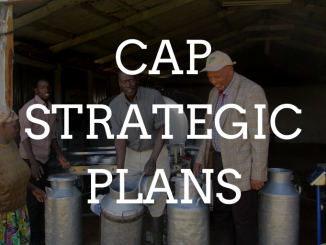
The current CAP process has hit a number of speedbumps – and now there’s COVID-19 to deal with. How will this impact civic engagement in CAP, and are there any ways to ensure civil society still has a say?
The CAP reform process: where are we now?
Since the Commission proposal in June 2018, CAP reform post-2020 has had a rough start, considering the EU elections, Brexit, and the difficult negotiations on the Multi-Financial Framework 2021-2027. The recent outbreak of the Corona Virus (COVID-19) adds an unexpected obstacle to the ordinary reform process, both at EU and national level. The reform process at the EU level is proceeding with the parallel negotiations taking place in the European Parliament and Council. Updated information on the Member States´ preparation of the CAP Strategic Plans is often difficult to access and compare, however, they seem to progress at different speeds and so far deal with SWOT analysis, assessment of needs, and stakeholder consultations.
The COVID-19 outbreak is certainly affecting numerous aspects of our daily lives, but how is it affecting the CAP reform process at the EU?
COVID-19 and the current CAP reform process
At EU level, the negotiations in the European Parliament have tried to progress as normal, until the latest news on Monday 9th March, when the entire week of plenary sittings in Brussels were cancelled due to precautionary measures against the spread of COVID-19. The March plenary week was moved to Brussels, instead of the normal plenary sittings in Strasburg, as an extraordinary measure to limit the spread of the virus. At the beginning of March, President Sassoli of the European Parliament stressed that parliamentary work will continue, including committee meetings.
However, the situation seems to have changed quite rapidly, and all European Parliament meetings are now cancelled until at least the 23rd March, including the AGRI-Committee meeting foreseen on 12 March, as well as the European Parliament´s internal meetings, currently taking place every Monday and Friday at technical level.
In the Agriculture and Fisheries Council, official press information confirmed that internal meetings on CAP reform have not been affected by measures to tackle COVID-19, so far at least. The next of AGRI-FISH Council meeting is to take place as scheduled on 23rd March.
The main issue at stake in the Council concerns the future budget of the CAP, which depends on the outcomes of the negotiations on Multi-Financial Framework 2021-2020. There are various interests and challenges to be reconciled in these negotiations. However, the growing spread of COVID-19, especially its direct relationship with food, may well have an impact on the priorities and political agenda of the future EU budget.
Beyond Brussels
Furthermore, the preparations for the CAP post-2020 go beyond the EU institutions, and involve also EU-wide workshops, seminars, and events, such as those organized by the European Network for Rural Development (ENRD), which supports the Member States and the Commission.
Among upcoming events, for instance, the ENRD Contact Point had to cancel the seminar ‘Designing LEADER for the future’. On the same page, the workshop planned by the ENRD Evaluation Helpdesk in April (Prague) to discuss the data management system for the Rural Development Programmes and CAP Strategic Plans is very likely to be cancelled due to the high risks of COVID-19 spread in Czech Republic.
How is COVID-19 affecting the Member States’ preparations?
The latest overview of Member State progress in preparing the CAP Strategic Plans is from the presentation of the Commission on the 3rd March 2020 during the 16th National Rural Network Meeting in Calatayud (Spain). In this first quarter of 2020, most of the Member States are carrying out or completing the SWOT analysis and assessment of needs.
In parallel, Member States are, to varying degrees, undertaking stakeholder consultations to gain additional insights and discuss the findings of the SWOT analysis. Some member states have planned nationwide consultations, others have been more circumspect.
Member States like Italy, which have been strongly hit by the COVID-19, are experiencing chaos and serious problems in proceeding with ordinary work. It is likely that, as COVID-19 continues to spread in Italy, ever further restrictions will be put in place, after a protected space, or lockdown announced Monday evening. Until 3rd April, Italians are asked to stay at home, and only attend urgent work, health appointments or to shop for basics. Face-to-face and public meetings involving multiple stakeholders will be not be possible in this context. France, having planned an ambitious consultation series, will probably face a similar situation, and we do not know the extent of the impact this will have on the CAP process.
This problem will likely take a toll on the inclusivity of the CAP reform process, hindering the participation of agricultural, forestry and rural stakeholders, as well as citizens and civil society organizations.
It may be more difficult to comment on draft documents of the SWOT analysis, to express voices and opinions on the prioritization of needs, or simply to engage in democratic and transparent preparation of the CAP Strategic Plans. The most delicate and vulnerable principle of including stakeholders throughout the design of the CAP Strategic Plans is at risk of being jeopardized. None of this will benefit those from civil society seeking significant change in the CAP.
Any Solutions?
Are there some solutions to deal with the unexpected threat to a large and inclusive stakeholder consultation for the design of the CAP Strategic Plan?
Before COVID-19 became a global health risk, France was one of the few Member States to make use of virtual platforms to complement physical meetings and consultations. One example is ‘Le débat en un clic’ (i.e. The debate in one click), a digital platform made available in the recently lunched stakeholder consultation to allow the general public to express their views on the prioritization of needs and CAP Specific Objectives, as well as to propose suggestions for the future CAP interventions.
Considering the limitations imposed on inter-regional mobility within a country, as are for instance emerging in Italy, initiatives as the ‘Les débats maison’ (The Home Debate Tool Kit) provides a kit with guidelines and templates to self-organise a stakeholder consultation “at home” with colleagues, students, and the local community and report the final outcomes to the national government.
Online public consultations are not new in this CAP reform. The same Commission proposal in June 2018 was built on an extensive online public consultation taking place between February to May 2017. Digital platforms are certainly not a new discovery, nor are they a panacea to ensure an inclusive, responsive and ‘healthy’ CAP reform.
In many Member States there is poor transparency and a limited access to national working groups, calendars, and documents, which can be made publicly available via webinars, online roadmaps, or websites – not to mention poor broadband in rural areas, where significant CAP stakeholders work and live.
Whether COVID-19 will exacerbate this or radically improve public engagement, that is something for the citizens, NGOs and stakeholder groups to decide. There is certainly room and tools available for improving the coordination across different levels of governance and adapt the process and working arrangements to this emergence.





